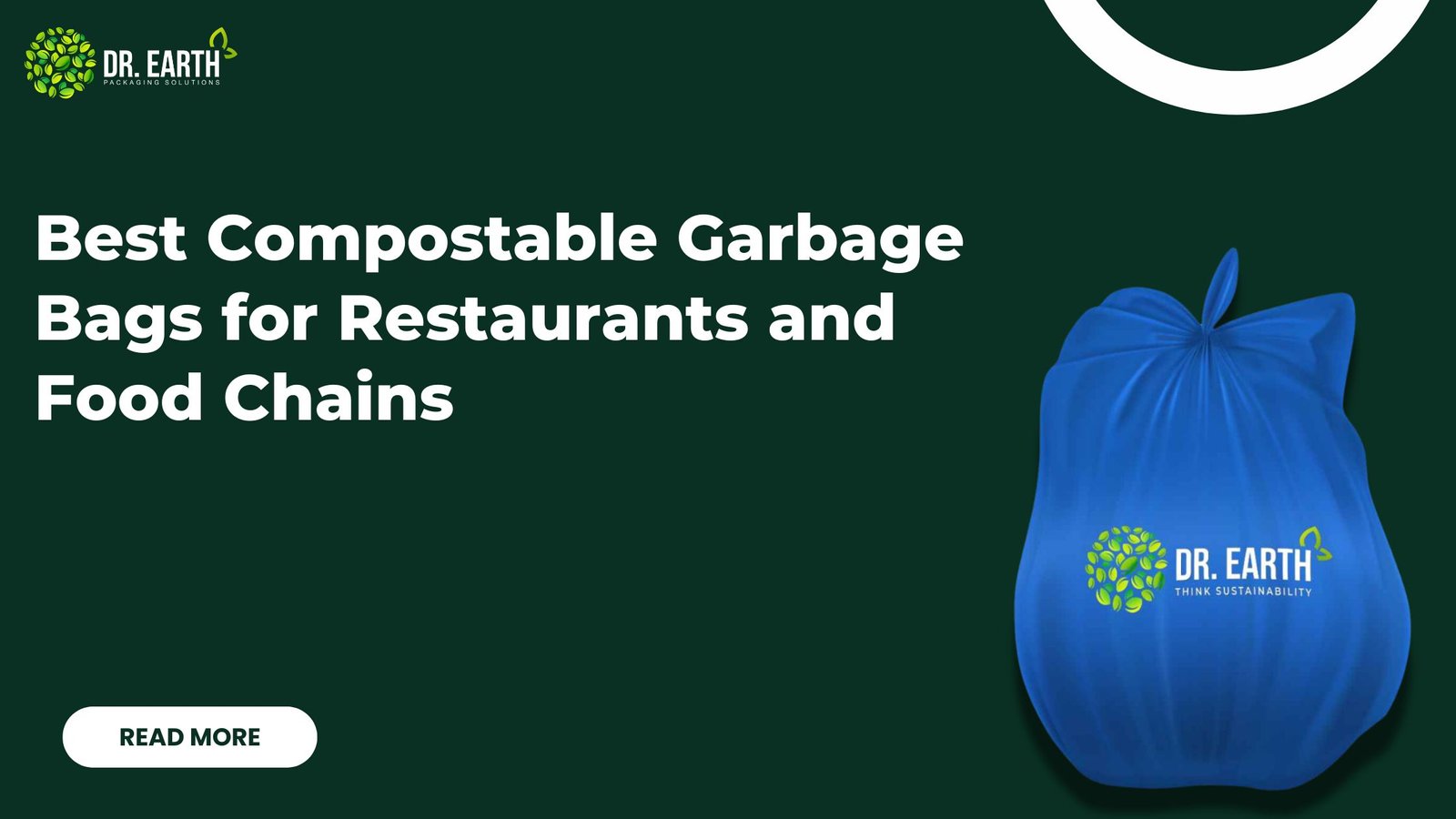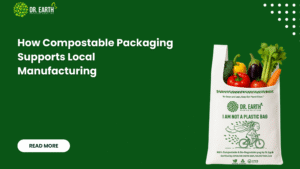
As we enter into an era where global warming and environmental issues occupy center stage in the media and public discussions, the food sector, particularly the restaurants and food chains, has a critical role to play regarding sustainability. All aspects of the food system—from sourcing food to packaging and disposing of waste—have some level of environmental impact. Waste disposal is often an overlooked aspect but has a significant opportunity to drive change, particularly when it comes to compostable trash bags!
In this blog, we will discuss the world of compostable trash bags and their benefits for restaurants and food chains, what problems they aim to solve, and why they are becoming a critical tool for businesses looking to reduce waste and their overall ecological footprint.
Why Compostable Garbage Bags Are Essential for Restaurants and Food Chains
Restaurants and food chains generate vast amounts of waste daily, much of which is organic — food scraps, vegetable peels, and biodegradable packaging. Traditionally, these waste streams have been handled using plastic garbage bags. However, plastic bags contribute significantly to landfill buildup and marine pollution, taking hundreds of years to decompose and leaching harmful chemicals into the environment.
Compostable garbage bags, on the other hand, are designed to decompose along with the organic waste they contain, turning into nutrient-rich compost in a matter of months. For restaurants and food chains, this simple switch offers numerous benefits:
- Environmental Impact: Restaurants can reduce the amount of plastic waste from all restaurant operations by simply switching to compostable garbage bags.
- Consumer Perception: Today’s consumers are more environmentally aware and looking at brand values and priorities when deciding who to purchase from and who to remain loyal to. Whether you are a fast-food chain or a high-end restaurant, visible commitment to sustainability—to be associated with a brand that contributes to reducing the amount of plastic waste in landfills with compostable garbage bags—is good for your brand image and ensures customer loyalty.
- Compliance: Many governments around the world are considering bans or regulations on single-use plastics. They are demonstrating a serious commitment to compliance, and composting will let restaurants be ahead of compliance.
- Operational Efficiencies: Compostable garbage bags will offer seamless collection and disposal of organic waste. When compostable garbage bags are disposed of at proper composting facilities, less wet waste will be headed to the landfill. composting organic waste offers restaurants a competitive advantage no other restaurant can offer.
What Makes a Garbage Bag Compostable?
Garbage bags are manufactured from naturally occurring, plant-based materials like cornstarch, polylactic acid (PLA), or polybutylene adipate terephthalate (PBAT) that were designed to break down in composting conditions into water, residual CO₂, and biomass. For a garbage bag to be genuinely compostable, it must conform to strict international standards such as
- EN 13432 (European standard for compostability)
- ASTM D6400 (American standard)
- BPI (Biodegradable Products Institute) certification
- TÜV Austria’s OK Compost certification
completely and safely, while leaving no toxic residue behind.
Benefits of Compostable Garbage Bags for Food Businesses
Let’s experience the advantages of compostable garbage bags for restaurants and food chains in more detail:
1. Environmental Stewardship
The restaurant industry is among the largest producers of food waste in the world. By utilizing compostable bags, organizations can achieve their sustainability goals by transforming waste into value. Whenever organic waste (including food waste and biodegradable packing) is collected in certified compostable bags and shipped to a composting facility, it enriches the soil and diminishes the need for synthetic fertilizers.
2. Reduced Carbon Footprint
Compostable garbage bags have a smaller carbon footprint than traditional plastics. Generally, they consume less energy in the production process and fewer greenhouse gases while breaking down. For chains mapping out their sustainability plans, this can be a tangible shift.
3. Compliance with Legislation
Countries and states globally are enforcing stricter laws for the use of plastics. The EU has released the Single-Use Plastics Directive, California’s SB 1383 requires reduction of food waste and a reduction of organic waste for food organizations, and even individual companies are working hard to combat plastic contamination in waste streams. Certified compostable garbage bags can assist in adhering to federal regulations while being environmentally conscious.
4. Enhanced Customer Trust
Consumers today are more environmentally aware and want to align their values with the businesses they support. By utilizing compostable garbage bags, a restaurant can send a strong message about environmental stewardship. As a result, businesses can gain loyal customers and acquire new customers who value sustainability in their purchase choices.
5. Improved Waste Management
Compostable garbage bags offer a simplified method for handling waste. There is no need to sequester food residue from a plastic bag, as compostable garbage bags can go straight to the compost bin. The use of compostable garbage bags simplifies processes for kitchen workers, reduces the risk of contamination in the composting streams.
Key Considerations When Choosing Compostable Garbage Bags
Not all compostable bags are equal. For restaurants and chains, it is essential to choose a bag that maintains the correct packaging type to ensure the bags lower greenhouse gas emissions, are sustainable, and effectively hold organic waste.
1. Material Composition
Select bags based on compostable material, such as cornstarch, PLA or PBAT, not on the word ‘biodegradable’. Bags made from the term ‘biodegradable’ then they are not certified and may only decompose by a percentage.
2. Certification
Look for a third-party certified bag such as BPI, TÜV Austria’s OK compost, or EN 13432, then you know you have the best composabi, premium, compostable bag, and it has been independently verified to meet compostability standards everywhere.
3. Strength and Durability
Garbage bags, in high volume settings elsewhere, like kitchens are dragged across floors and used for holding wet, heavy organic waste. Choose compostable bags that are commercial grade with reinforced seams and leak-resistant features.
4. Size and Fit
Compostable bags come in various sizes. Restaurants should choose bag sizes that fit properly inside the bin, to avoid overfilling, girth, and spillage, which jeopardizes potential for waste collection efficiency.
5. Storage Conditions
If using compostable bags, please consider storing them in a cool, dry place. Premature breakdown can occur due to exposure to heat and moisture causing effectiveness issues.
Overcoming Challenges in Adoption
The advantages are clear; however, restaurants may still be faced with challenges in switching to compostable garbage bags:
- Higher Costs: Compostable bags are often more expensive than traditional plastic bags. Nevertheless, the advantages of using compostable garbage bags, such as potential savings with waste removal fees and strengthening brand value, will outweigh the costs.
- Limited Supplies: Not all suppliers sell certified compostable garbage bags. Ensure you partner with a reliable supplier, like Dr. Earth, that provides certified compostable products.
- Education and Training: Staff education may be necessary in the intended use of the compostable garbage bags and waste segregation to prevent contaminating them and limit any disruptions in the composting process.
Real-World Implementation: Steps for Success
If a restaurant or food chain wishes to adopt compostable garbage bags successfully, it is important to remember the following:
- Conduct a Waste Audit: Assess the volume and type of organic waste is creating a guideline for appropriate-sized, compostable garbage bags.
- Source Certified Compostable Bags: Work with trusted suppliers (like Dr. Earth) to procure certified compostable garbage bags that will work for you.
- Training Staff: Educate kitchen and cleaning staff about compostable garbage bags, proper waste segregation and composting procedures.
- Work with Local Composting Facilities: Provide local pandemics partners; who can handle
- Monitor and Adjust: Regularly review your composting practices. Gather feedback from staff and partners to refine processes and maximize environmental benefits.
Conclusion: The Future of Waste Management in the Food Industry
Transitioning to compostable garbage bags is truly not a fad – it is quite simply the right decision for a restaurant or food chain in today’s market. By using compostable bags, businesses are making a contribution to the reduction of plastic pollution, compliance with regulations that are ever changing, and building a sustainability image that resonates with consumers today.
As regulations tighten and consumer expectations continue to change, this is the time for food businesses to lead the way. A simple way to start is by using compostable garbage bags. By making the shift, your restaurant or food chain will be on the right track to being a leader in the field of positive environmental change – all while reaping the operational and reputational benefits that accrue to working with compostable garbage bags.
FAQs
Q-1 What’s the difference between compostable and biodegradable garbage bags?
Ans- Compostable bags compost down to natural elements without leaving toxins behind under composting conditions, while biodegradable bags can only certify partial degradation, which may leave other things behind like microplastics.
Q-2 How long do compostable garbage bags take to decompose?
Ans- It can vary, but typically they will decompose in 90 – 180 days in an industrial composting facility.
Q-3 Are compostable garbage bags strong enough for heavy kitchen waste?
Ans- Yes – good quality compostable bags will be able to hold up for the specified weight of most nominal kitchen waste.
Q-4 Can I use compostable bags in a home compost setup?
Ans- Some compostable bags are suitable for home composting, but always check for certification (like OK Compost HOME).
Q-5 Where can I find certified compostable garbage bags?
Ans- Trusted suppliers like Dr. Earth offer a wide range of certified compostable garbage bags suitable for restaurants and food chains.
Share:
Related Posts














